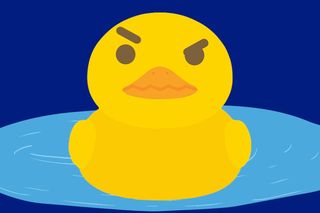
Throw Out Your Rubber Duckies
Bath toys are full of disgusting germs.

Baths, once unanimously revered, have fallen out of favor lately. Public opinion is divided: are they a luxurious form of Sunday night self-care, or are they disgusting (and literal) cesspools of your own bacteria?
If you own any number of rubber duckies, there could be reason to believe in the latter definition. A new study has found that rubber duckies — and other seemingly harmless bath toys — may not just be good, clean bath time entertainment. There may be nothing good or clean about them. In fact, they’re probably the dirtiest thing in your bathtub.
The study analyzed the bacterial communities in 19 bath toys that were tested in both clean and used bathwater. Fungi were found in 58% of all the bath toys, and in 100% of the toys that had been placed in used water.
Rubber duck bath toys are not really made of rubber, and that might just be the problem. The researchers believe that the low quality polymeric material that the ducks and other bath toys are often made of is what makes them so conducive to bacterial growth.
Essentially, the cheap plastic not only “leeches” organic matter from the water, but also releases a significant amount of it through leakage. Organic carbon is basically heaven for microbe communities.
Where do these microbes come from? Well, aside from the obvious — human secretions — they can even come from tap water and bath products (soap, shampoo, bath bombs, you name it).
Some of the microbe communities can contain harmful pathogens. The researchers point out that a drug-resistant outbreak of the bacterial infection P. aeruginosa at a children’s hospital in 1998 was traced back to shared bath toys.
If you aren’t already reaching for gloves with which you can trash all your kid’s rubber ducks without ever having to touch them directly again, know that the study also found several indications that fecal bacteria ended up on the bath toys.
Interestingly, in an instance where science admits to being late to the game, the researchers noted that while little scientific research exists around how disgusting (and potentially harmful) rubber ducks are, mommy blogs have known about the issue for a while now.
The study is one of the latest in a stream of research around the germs that exist in common household items. One study found that one-third of women’s purses contain fecal bacteria. Our phones are 10 times dirtier than a toilet seat (toilet seats, incidentally, are relatively clean in comparison to the things we don’t realize are carrying fecal bacteria — like cutting boards).
Ultimately, all this fear-mongering might be causing more harm than good. Scientists have been hypothesizing that human immunity is growing collectively weaker because we’re just too clean, and that our reduced exposure to germs is increasing our chances of contracting autoimmune diseases, allergies, or asthma.
In the case of the duckies, however, resident bacteria did cause at least one known outbreak in children. The study’s researchers conclude that a more detailed risk assessment needs to be conducted to understand whether or not the bath toys pose a serious threat of infection.
Baths might be nasty, outdated rituals that should have been precluded by the advent of showers, or they may be a peaceful way to disconnect and pamper yourself in a stressful world. Wherever you fall on that spectrum, however, it may be best to get your ducks in a row and straight into the trash.
Urvija Banerji is the Features Editor at The Swaddle, and has previously written for Rolling Stone India and Atlas Obscura. When she's not writing, she can be found in her kitchen, painting, cooking, picking fights online, and consuming large amounts of coffee (often concurrently).
Related


Let’s Talk About Mental Health
